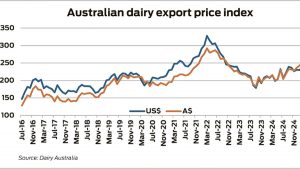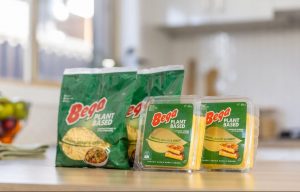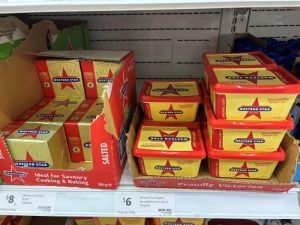
This is despite the dairy and food giant reporting record revenue and increased profits only two months ago.
Bega Cheese executive chairman Barry Irvin said higher input costs and supply chain disruption would see some of its costs passed on to consumers.
The company owns some of Australia’s most well-known brands, including Vegemite, but has also recently added yoghurt, juice, and flavoured milks to its product mix.
“The overall farm gate price is going up as well and that, of course, all translates into increased need for pricing on the market,” Mr Irvin said.
Global pressures on supply
He said the Russian invasion of Ukraine had increased input costs and new COVID-19 lockdowns in China were disrupting the flow of dairy products into key Asian markets.
“We do sell a variety of products into China, largely cream cheese, some powders and lactoferrin, and that largely goes to the port of Shanghai,” Mr Irvin said.
“[It] is very disrupted at the moment due to COVID-19 lockdowns.
“The way I would look at this year is that, while COVID has been the big impact, there have been other unfolding impacts that have kept us on our toes.”
Record milk price
Bega Cheese has announced a record farm gate milk price for dairy farmers in Victoria, South Australia and NSW.
Victorian and SA farmers will receive $8.40 per kilogram of milk solids (kgms) in the next financial year.
Farmers in the Bega Valley will be paid $9kgms, which is a 16 per cent increase compared to last year, with other regions expected to be announced in coming days.
The increase in the farm gate price this year has been underpinned by strong global dairy prices and a shrinking milk pool in Australia, which meant competition was fierce between processors.
The processor wanted to encourage its suppliers to produce more milk and stem the tide of people leaving the industry.
Price rise welcomed
Farmers have welcomed the increase in the farm gate price while acknowledging the challenges of managing floods, inflation and labour shortages.
Bega Valley dairy farmer Robert Russell said it was a “terrific price that will keep farmers happy.”
“$9, it’s really something, a huge jump,” he said.
After managing persistent floods across his farm, Robert Russell believed a price rise was needed to offset increasing costs.
“It’s been quite a drag the last month or so with the wet weather in the mud.”
He said it had led to mastitis and sore feet for dairy cows.
“Input costs, fuel and fertiliser in particular and some chemicals, all the gains have just been wiped away, and on top of that, there are significant labour issues for a lot of farms,” he said.
























